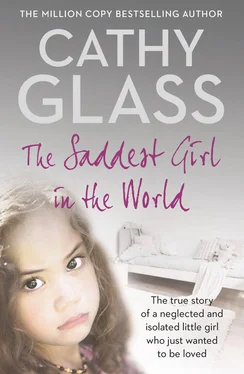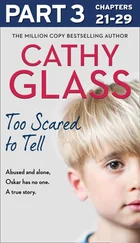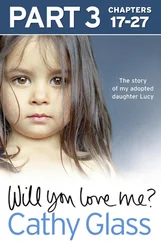This book is a work of non-fiction based on the recollections of Cathy Glass. The names of people, places, dates and details of events have been changed to protect the privacy of others.
HarperElement
An imprint of HarperCollins Publishers Ltd. 1 London Bridge Street London SE1 9GF
www.harpercollins.co.uk
First published by HarperElement 2009
Copyright © Cathy Glass 2007
Cathy Glass asserts the moral right to be identified as the author of this work
A catalogue record of this book is available from the British Library
All rights reserved under International and Pan-American Copyright Conventions. By payment of the required fees, you have been granted the non-exclusive, non-transferable right to access and read the text of this e-book on-screen. No part of this text may be reproduced, transmitted, down-loaded, decompiled, reverse engineered, or stored in or introduced into any information storage and retrieval system, in any form or by any means, whether electronic or mechanical, now known or hereinafter invented, without the express written permission of HarperCollins e-books
HarperCollins Publishers has made every reasonable effort to ensure that any picture content and written content in this ebook has been included or removed in accordance with the contractual and technological constraints in operation at the time of publication
Source ISBN: 9780007281039
Ebook Edition © MARCH 2009 ISBN: 9780007321575
Version: 2016–08–19
Cover
Title Page
Copyright
Prologue
Chapter One - Sibling Rivalry
Chapter Two - So Dreadfully Sad
Chapter Three - Donna
Chapter Four - Silence
Chapter Five - Cath—ie
Chapter Six - Amateur Psychology
Chapter Seven - Runt of the Litter
Chapter Eight - Dirty
Chapter Nine - Outcast
Chapter Ten - Tablets
Chapter Eleven - A Small Achievement
Chapter Twelve - Working as a Family
Chapter Thirteen - The Birthday Party
Chapter Fourteen - No Dirty Washing
Chapter Fifteen - Mummy Christmas
Chapter Sixteen - Winter Break
Chapter Seventeen - Final Rejection
Chapter Eighteen - Don't Stop Loving Me
Chapter Nineteen - Paula's Present
Chapter Twenty - The Question
Chapter Twenty-one - A Kind Person
Chapter Twenty-two - Marlene
Chapter Twenty-three - Lilac
Chapter Twenty-four - Introductions
Chapter Twenty-five - Moving On
Epilogue
Exclusive sample chapter
Cathy Glass
Moving Memoirs eNewsletter
Also by Cathy Glass
About the Publisher
This is the story of Donna, who came to live with me when she was ten. At the time I had been fostering for eleven years, and it is set before I had fostered Lucy, whom I went on to adopt. When Donna arrived, my son Adrian was ten and my daughter Paula was six; the impact Donna had on our lives was enormous, and what she achieved has stayed with us.
Chapter One Sibling Rivalry
It was the third week in August, and Adrian, Paula and I were enjoying the long summer holidays, when the routine of school was as far behind us as it was in front. The weather was excellent and we were making the most of the long warm days, clear blue skies and the chance to spend some time together. Our previous foster child, Tina, had returned to live with her mother the week before and, although we had been sorry to see her go at the end of her six-month stay with us, we were happy for her. Her mother had sorted out her life and removed herself from a highly abusive partner. Although they would still be monitored by the social services, their future looked very positive. Tina's mother wanted to do what was best for her daughter and appeared to have just lost her way for a while — mother and daughter clearly loved each other.
I wasn't expecting to have another foster child placed with me until the start of the new school term in September. August is considered a ‘quiet time’ for the Looked After Children's teams at the social services, not because children aren't being abused or families aren't in crises, but simply because no one knows about them. It is a sad fact that once children return to school in September teachers start to see bruises on children, hear them talk of being left home alone or not being fed, or note that a child appears withdrawn, upset and uncared for, and then they raise their concerns. One of the busiest times for the Looked After Children's team and foster carers is late September and October, and also sadly after Christmas, when the strain on a dysfunctional family of being thrust together for a whole week finally takes its toll.
It was with some surprise, therefore, that having come in from the garden, where I had been hanging out the washing, to answer the phone, I heard Jill's voice. Jill was my support social worker from Homefinders Fostering Agency, the agency for whom I fostered.
‘Hi, Cathy,’ Jill said in her usual bright tone. ‘Enjoying the sun?’
‘Absolutely. Did you have a good holiday?’
‘Yes, thanks. Crete was lovely, although two days back and I'm ready for another holiday.’
‘Is the agency busy, then?’ I asked, surprised.
‘No, but I'm in the office alone this week. Rose and Mike are both away.’ Jill paused, and I waited, for I doubted she had phoned simply to ask if I was enjoying the sun or lament the passing of her holiday. I was right. ‘Cathy, I've just had a phone call from a social worker, Edna Smith. She's lovely, a real treasure, and she is looking to move a child — Donna, who was brought into care at the end of July. I immediately thought of you.’
I gave a small laugh of acknowledgement, for without doubt this prefaced trouble. A child who had to be moved from her carer after three weeks suggested the child had been acting out and playing up big time, to the point where the carer could no longer cope.
‘What has she done?’ I asked.
It was Jill's turn to give a small laugh. ‘I'm not really sure, and neither is Edna. All the carers are saying is that Donna doesn't get along with her two younger brothers. The three of them were placed together.’
‘That doesn't sound like much of a reason for moving her,’ I said. Children are only moved from a foster home when it is absolutely essential and the placement has irretrievably broken down, for clearly it is very unsettling for a child to move home.
‘No, that's what I said, and Edna feels the same. Edna is on her way to visit the carers now and see what's going on. Hopefully she'll be able to smooth things over, but is it OK if I give her your number so that she can call you direct if she needs to?’
‘Yes, of course,’ I said. ‘I'll be in until lunchtime, and then I thought I would take Adrian and Paula to the park. I'll have my mobile with me, so give Edna both numbers. I assume that even if Donna has to be moved there won't be a rush?’
‘No, I shouldn't think so. And you're happy to take her, if necessary?’
‘Yes. How old is she?’
‘Ten, but I understand she is quite a big girl and looks and acts older than her years.’
‘OK, no problem. Hopefully Edna can sort it out if it's only sibling rivalry, and Donna won't have to move.’
‘Yes,’ Jill agreed. ‘Thanks. Enjoy the rest of your day.’
‘And you.’
She sighed. ‘At work?’

I returned to the garden to finish hanging out the washing. Adrian and Paula were in the garden, playing in the toy sandpit. While Paula was happy to sit at the edge of the sandpit and make little animal sand shapes with the plastic moulds, Adrian was busy transporting the sand with aid of a large plastic digger to various places on the lawn. There were now quite sizeable hills of sand dotted on the grass, as if some mischievous mole had been busy underground. I knew that the sand, now mixed with grass, would not be welcomed back into the sandpit by Paula, who liked the sand, as she did most things, clean.
Читать дальше













